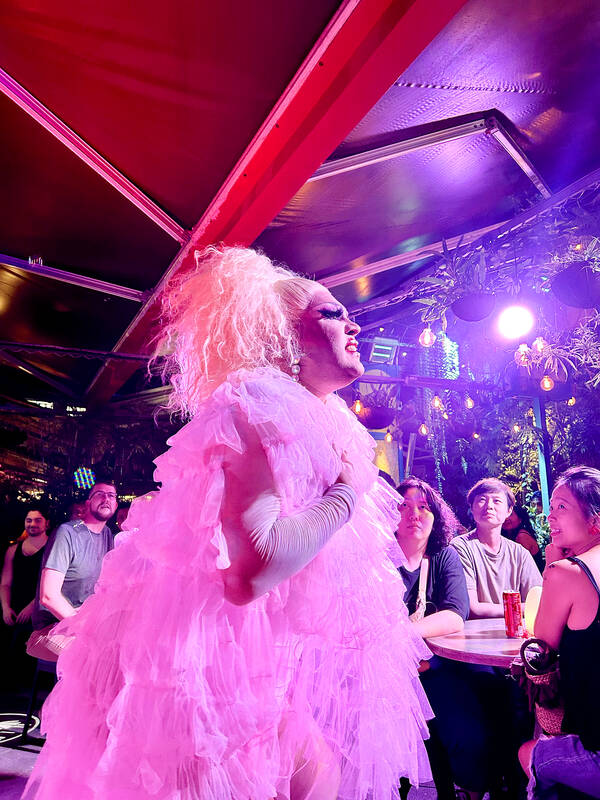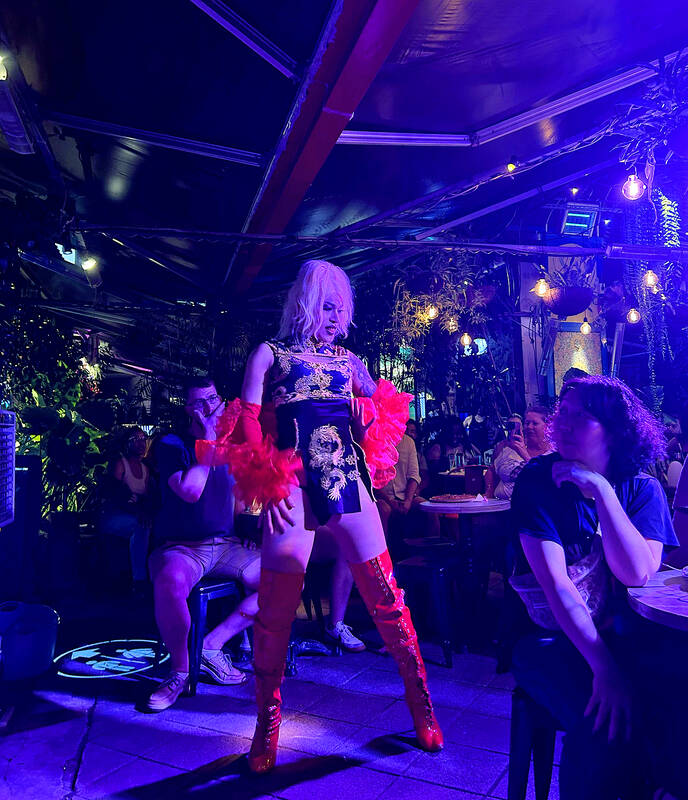A few wily notes of a snake charmer’s flute twirl through the air as drag queen Xuren (由序人) shimmies in time with the music. Dressed in a glittery, green snake-skin bodysuit, a flowing silk robe and black six-inch, lace-up stilettos, Xuren abruptly stops dancing as the music halts.
American pop music soon begins blaring, Xuren drops into the splits and the audience at Cafe Dalida erupts in screams.
Founded by Alvin Chang (張原韶), the venue is one of Taiwan’s hottest drag bars and is a hub for both veteran and up-and-coming queens, as well as dedicated locals and wide-eyed tourists. It has also become a safe space for the queer community.

Photo: Anouk Yeh
Chang first encountered queer nightlife while traveling in Europe with the China Youth Corps (救國團). In 1996, he returned to Taipei, which only had one gay bar at the time, and began DJing at Source — “an unofficial gay bar” — and organizing “gay nights” and drag shows there.
“At that time, you couldn’t even buy rainbow flags in Taiwan,” Chang said. “I had to buy scrap fabric and make the rainbow decorations myself.”
Five years later, Chang went on to open his first gay bar, Fresh, with a friend. In 2001, he opened Cafe Dalida.

Photo: Anouk Yeh
Tucked in Ximen’s Red House plaza, the outdoor bar is strung with dozens of fairy lights and lush green foliage. The Cafe hosts bi-weekly drag performances, from artist-themed shows (Beyonce or Lady Gaga) to international drag queen features.
Dalida is where many popular queens in the Taipei drag scene got their start.
THE MAKING OF THE QUEENS
The first time Xuren performed drag was in 2018 at Dalida, during a recurring queer dance and drag party Chang co-hosts called the CUM (Create Ur Magic) Party.
Xuren performs at different venues almost weekly. They design their own costumes, makeup and performance concepts.
Another Taipei drag queen who got her start at Dalida is Amily Givenchy. Originally from South Africa, Amily, whose real name is Angus Botha, first encountered drag after moving to Taiwan in 2014. After she became a regular at Dalida, she was invited to perform at CUM Party.
Amily said that her drag inspiration comes from her “incredibly strong” mother, grandmother and sister.
“[Drag] is my love letter to them and my way of saying thank you,” Amily said.
Botha says there’s a strong sense of community among the queens in Taipei. She points to other queens such as Bouncy Babs and Magnolia as foremothers of the Taipei drag scene.
“There’s a lot of love and respect for one another. It’s a close-knit community because we all have to work together to keep [drag] existing,” Amily said.
A STRONG LOCAL COMMUNITY
The supportive nature of the drag community extends beyond the performers.
Hsu Bo-chao (許博超) started attending drag shows after being introduced to Cafe Dalida in June last year. Since then, he has gone out to watch drag shows every week.
Hsu said that watching drag helped him discover that he was bisexual.
“Because of the drag shows, I was opened to a new world,” he said.
Hsu said that aside from helping him discover his sexuality, drag has also “transformed” him into a more confident and outgoing person. When he’d arrive at Dalida wearing more traditionally feminine outfits, the queens and patrons would always compliment him.
“People here don’t degrade you, they just praise you,” Hsu said.
Hsu said he used to always be a people pleaser.
“Now, when I make friends, I use a mantra of, if I like myself, other people will like me,” he said.
AN INTERNATIONAL AUDIENCE
In addition to a supportive local community, Dalida also boasts a large foreign audience. During Dalida’s June 24 Dragon Boat Festival performance, the audience consisted of people hailing from France, Germany and the US.
Also in the audience that night were Lizi Olson and Pamela Nakanelua, a pair of sisters in their late fifties traveling from Hawaii.
During the show, Olson and Nakanelua — who was wearing a shirt bearing the image of US drag icon Sasha Colby — sat front and center, animatedly interacting with the queens and Go Go dancers. At one point, a male Go Go dancer approached their table.
“I was so excited, I fell off my chair!” Olson said.
While the drag scene in Taipei hasn’t been easy to keep alive, the queens have high hopes for the future of drag in the city. Amily said that performing drag has given her “so much respect for what women go through.”
“I think everybody should get in drag at least once and spend a minute walking in someone else’s shoes,” she said.

In the March 9 edition of the Taipei Times a piece by Ninon Godefroy ran with the headine “The quiet, gentle rhythm of Taiwan.” It started with the line “Taiwan is a small, humble place. There is no Eiffel Tower, no pyramids — no singular attraction that draws the world’s attention.” I laughed out loud at that. This was out of no disrespect for the author or the piece, which made some interesting analogies and good points about how both Din Tai Fung’s and Taiwan Semiconductor Manufacturing Co’s (TSMC, 台積電) meticulous attention to detail and quality are not quite up to

April 21 to April 27 Hsieh Er’s (謝娥) political fortunes were rising fast after she got out of jail and joined the Chinese Nationalist Party (KMT) in December 1945. Not only did she hold key positions in various committees, she was elected the only woman on the Taipei City Council and headed to Nanjing in 1946 as the sole Taiwanese female representative to the National Constituent Assembly. With the support of first lady Soong May-ling (宋美齡), she started the Taipei Women’s Association and Taiwan Provincial Women’s Association, where she

It is one of the more remarkable facts of Taiwan history that it was never occupied or claimed by any of the numerous kingdoms of southern China — Han or otherwise — that lay just across the water from it. None of their brilliant ministers ever discovered that Taiwan was a “core interest” of the state whose annexation was “inevitable.” As Paul Kua notes in an excellent monograph laying out how the Portuguese gave Taiwan the name “Formosa,” the first Europeans to express an interest in occupying Taiwan were the Spanish. Tonio Andrade in his seminal work, How Taiwan Became Chinese,

Mongolian influencer Anudari Daarya looks effortlessly glamorous and carefree in her social media posts — but the classically trained pianist’s road to acceptance as a transgender artist has been anything but easy. She is one of a growing number of Mongolian LGBTQ youth challenging stereotypes and fighting for acceptance through media representation in the socially conservative country. LGBTQ Mongolians often hide their identities from their employers and colleagues for fear of discrimination, with a survey by the non-profit LGBT Centre Mongolia showing that only 20 percent of people felt comfortable coming out at work. Daarya, 25, said she has faced discrimination since she